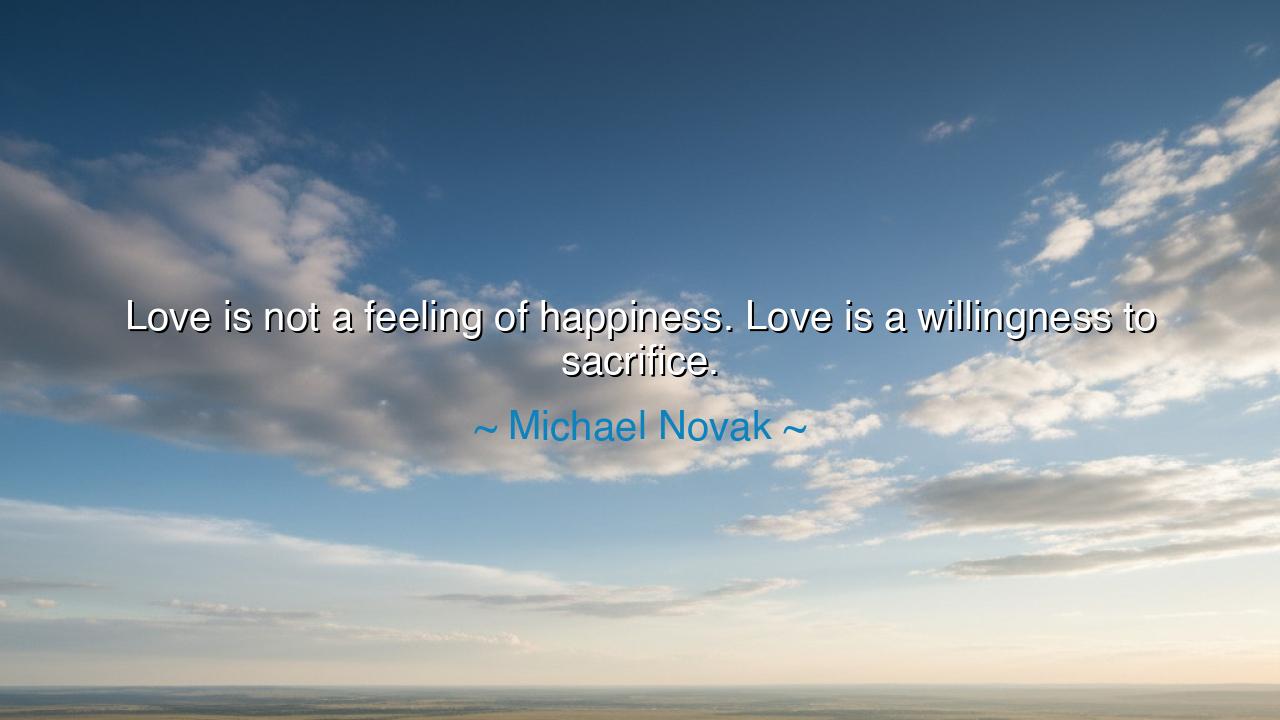
Love is not a feeling of happiness. Love is a willingness to






The theologian and philosopher Michael Novak once declared, “Love is not a feeling of happiness. Love is a willingness to sacrifice.” In this single sentence, he reveals one of the deepest truths about the human heart — that love, in its truest form, is not born of pleasure, but of commitment, not of fleeting emotion, but of enduring action. To the wise, love is not a storm of passion or a dance of delight, but a sacred choice — the choice to give of oneself, to bear pain for the sake of another, and to remain steadfast when all comforts fade. This is not the love of songs or stories, but the love of saints and heroes, of parents and protectors, of those who understand that the soul’s highest joy is found not in taking, but in giving.
Novak, a man who devoted his life to exploring the intersection of faith, family, and moral purpose, spoke these words not as sentiment, but as truth tested by experience. He saw that in the modern age, love is too often mistaken for happiness, for that bright but passing warmth that flickers in the heart when things are easy. But happiness is the flower; sacrifice is the root. Without it, love cannot endure the winds of suffering, disappointment, or time. True love, Novak teaches, is the courage to stay when joy departs, to hold another’s burden as your own, to suffer willingly that someone else may live more fully. This love, though it may wound, is also the love that redeems.
Such wisdom is not new. The ancients too knew that love is measured not by pleasure but by devotion. The Greeks called this highest form of love agape — the selfless, divine love that gives without expecting return. In every great civilization, love has been honored not for what it feels, but for what it endures. The warrior who dies for his people, the mother who suffers for her child, the friend who stands firm through disgrace — all these are manifestations of the same sacred truth: that to love is to offer oneself as a living gift. For sacrifice is the purest language of love, spoken not with words, but with deeds.
Consider the story of Maximilian Kolbe, a Polish priest imprisoned in the Nazi camp at Auschwitz. When a fellow prisoner, a father of two, was condemned to die, Kolbe stepped forward and offered his own life in the man’s place. He entered the starvation cell and, for two weeks, comforted the dying with prayer until he himself perished. Kolbe’s act was not born of happiness — he did not seek joy in suffering — but of willingness, the essence of Novak’s teaching. His love was not sentimental but sacrificial, not a feeling but a choice made in full awareness of the cost. And yet, in that final act, he achieved a kind of divine happiness — the peace that comes when love fulfills its highest purpose.
In everyday life, this same truth lives quietly in unseen acts of devotion. The nurse who stays through the night with the dying, the father who labors without rest to feed his family, the spouse who forgives again and again — each gives a piece of their heart without fanfare. This is love as willingness to sacrifice, love that gives strength instead of demanding comfort, love that persists through hardship because it sees beauty in endurance. Such love does not always bring joy to the body, but it nourishes the soul with a deeper peace — the peace of knowing that one’s life has meaning through giving.
And yet, Novak’s wisdom is not meant to rob love of tenderness or joy. Rather, he reminds us that true happiness is born from sacrifice, not the other way around. The one who loves deeply will still know delight — but it will be the delight of purpose, not the pleasure of ease. When we give of ourselves, when we pour out our time, our energy, our comfort for another, the joy that comes is quieter, purer, and far more enduring than the shallow happiness that fades with circumstance. It is the joy of knowing that love, once given, never dies — that it becomes a light in another’s life, and in that way, a light to the world.
So, my child, learn this and carry it within your heart: love is not comfort, but courage. Do not measure love by how much happiness it gives you, but by how much strength it awakens in you to give of yourself. When the moment comes that love demands something hard — patience, forgiveness, sacrifice — do not shrink away, for in that moment, you are closest to the divine. Choose to love not when it is easy, but when it is costly, and you will discover what Novak and all the wise before him have known: that the secret of love is not in how much we receive, but in how much we give — willingly, fully, and forever.






AAdministratorAdministrator
Welcome, honored guests. Please leave a comment, we will respond soon